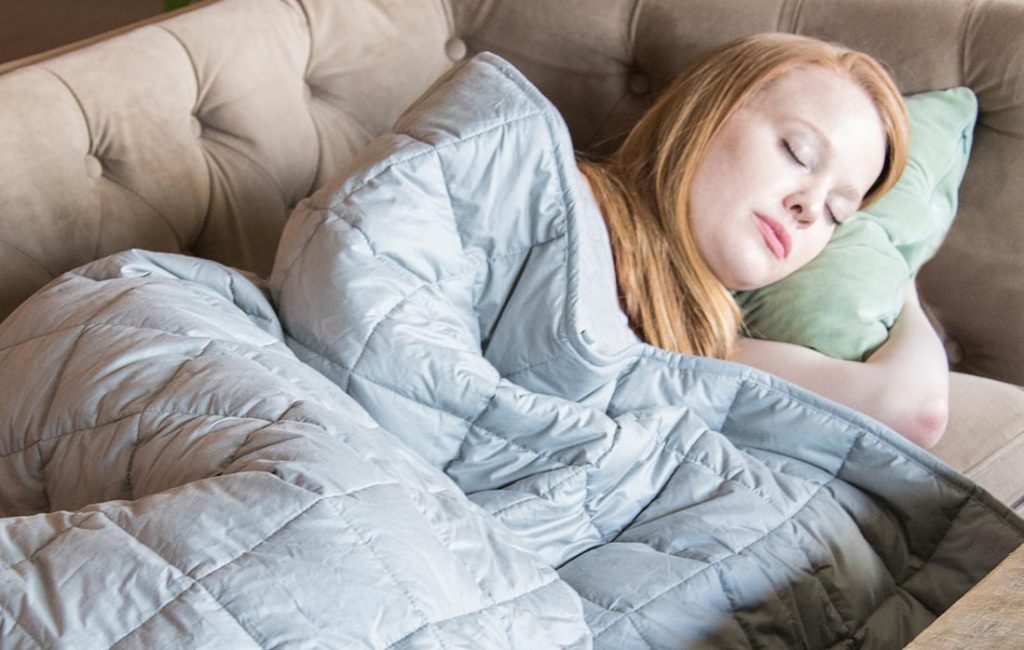
I tossed and turned all night with hip and back pain, with a side of anxiety. I couldn’t settle. I was pulling at the covers, getting tangled, and using 3 a.m. as the best time to obsess about my biggest worries. I was turning into an insomniac — until a friend gifted me a weighted blanket. Also claustrophobic, I thought there was no way that it would help me, and that I’d just feel trapped under the pressure. But luckily, it was also a cooling weighted blanket, so nothing was further from the truth. When I awoke after my first full night of sleep I was shocked, and confused. Why did that work? How did that work? Are we all just one weighted blanket away from the perfect night’s sleep?
I headed online to find the research about this miracle blanket. In an October 2022 study, a weighted blanket increased melatonin levels by 32 percent when researchers compared participants’ sleep with a weighted blanket and without. As someone who has always been a bit nervous to take melatonin supplements, this alternative was a promising solution. Here’s what the experts had to say about the myth or magic of weighted blankets.
How do weighted blankets work?
Scientists are still trying to figure out the exact mechanism that causes weighted blankets to release melatonin, helping with sleep. The same study says that one explanation involves pressure exerted by the blanket impacts our sensory input, carrying that sensory information via our spinal cord to the brainstem. There, neurons are released that can promote calm and well-being, and decrease the bad stuff that keeps us awake in the night — pain, stress, and fear. Also, they connect to the pineal gland, which releases melatonin, hence the higher numbers in the participants’ levels when they had the blanket on.
“We don’t know how, exactly, weighted blankets work,” Dr. Robin Tucker, Assistant Professor at Michigan State University, who studies the relationship between insufficient sleep and nutrition, says. “Some researchers believe the pressure provided promotes activation of the parasympathetic nervous system (PNS). PNS activation causes heart rate and blood pressure to decrease, helping you relax and feel less anxious – both of which should promote sleep.”
Weighted blankets essentially work like a calming blanket, and some studies show the impact of deep pressure on anxiety.
Are Weighted Blankets Safe? (to Use Every Night)?
Like melatonin supplements, some troubled sleepers wonder if this is a sustainable solution that people can use every night. Both experts say yes, and Tucker adds that there are limited concerns about side effects.
“Although if the blanket is too heavy, difficulty changing position or feelings of physical discomfort could arise,” she says. “For individuals with respiratory issues, doubling the blanket over the chest should be avoided. At least one report of increased anxiety has been published, but most people feel weighted blankets have a calming effect.”
The simple solution is to ensure you are choosing a blanket that is 10 percent of your body weight. So, if you weigh 150 pounds, you shouldn’t have a blanket heavier than 15 pounds to start.
When you start to use the blanket, pay attention to your own comfort to ensure the weight feels right to you, and that it isn’t too heavy to move freely, and breathe.
What to look for in a weighted blanket
Blankets come with various features to make them more breathable, not too hot, and with the weighted beads evenly distributed.
Sleepopolis has compiled several recommendations for weighted blanket shoppers, including:
- Best overall: Gravity — This blanket uses microbeads that are so small you can’t even feel them, and it comes in a larger size, a 35-pound blanket in queen/king size that’s great for couples.
- Most breathable: Bearaby — Made of organic cotton and a wide weave structure for breathability, testers say this has an “already worn-in feel”.
- Best for hot sleepers: Nectar Serenity — With a warming and cooling side that you can flip over, and a t-shirt material, this blanket is best if you run hot.
Consider looking for blankets with a forgiving return policy, so that you can ensure the blanket is the perfect fit for you long term.
Should It Replace Nightly Melatonin?
Though the above study showed that melatonin levels increased, many other studies simply point to it improving anxiety, but not necessarily being a full solution to insomnia. For example, a 2020 review in the American Journal of Occupational Therapy concludes it to be a therapeutic tool for anxiety, but that there wasn’t enough evidence to suggest it as a complete insomnia fix.
Tucker echoes this sentiment, recommending people with insomnia not pitch their melatonin bottles just yet. “People typically take melatonin because they have difficulty falling asleep. Melatonin supplementation has been shown to decrease the time it takes to fall asleep, increase time spent asleep, and improve sleep quality,” she says. “Studies on weighted blankets rarely demonstrate any improvements in these sleep outcomes. While one study reported an increase in melatonin levels when a weighted blanket was used, there were no differences in sleep outcomes when people used the weighted vs. non-weighted blankets.”
She adds that people can continue to take melatonin if they want, and that the potential increase from a weighted blanket is unlikely to “cause serious problems” in conjunction with melatonin supplements.
Others might find that the blanket itself is enough to promote better sleep, and that they stop needing the supplement.
Beyond Weighted Blankets: Tips to Get More Sleep
Weighted blankets aren’t a one-size-fits-all solution, and some people might benefit from other sleep health solutions in addition. In addition to the blanket, you can try these sleep interventions for an overall better night’s sleep:
- Eliminate caffeine, agitating foods, and blue light a few hours before bed
- Create and maintain a wind-down routine, that might include activities like herbal tea, soothing music, a book, and lowered lights
- Actively address any health concerns that might be impeding on sleep, from sleep apnea symptoms to untreated mental health conditions
- Lower your bedroom temperature (which you might want to do with a weighted blanket as well) and sleep in a quiet, dark space
- Exercise during the day for better sleep at night
Finally, it’s imperative to talk to your doctor about best sleep solutions for you, including any questions about the safety or efficacy of a weighted blanket.



























